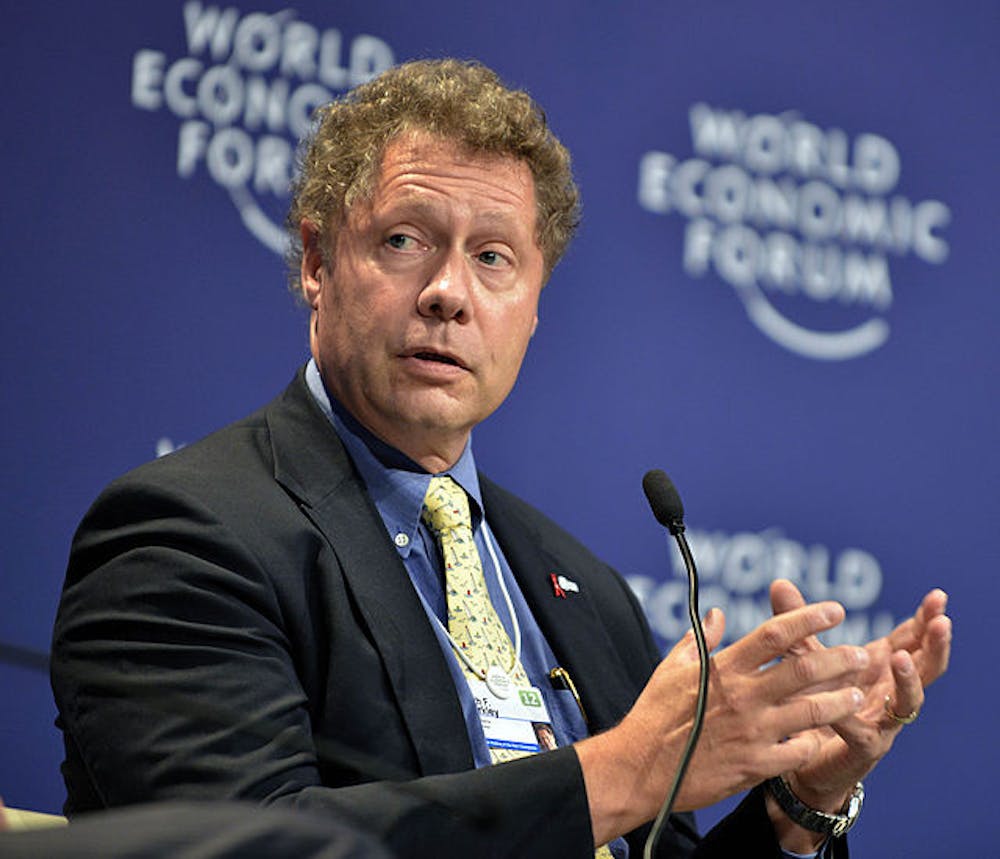When Seth Berkley ’78 MD ’81 raised $33 billion for vaccinations, he often heard donors and supporters vow that they would “do whatever it takes” to address the ongoing public health crisis.
But Berkley has found that after the initial wave of panic following the emergence of a pandemic, the public health systems and prevention initiatives designed to address these outbreaks become neglected and underfunded.
This fall, Berkley returned to Brown, his alma mater, to help address these “panic-neglect cycles” as senior advisor to the Pandemic Center at the School of Public Health.
The Pandemic Center, which opened in 2022, is an interdisciplinary research center that looks to understand these international disease outbreaks and develop “the tools, policies and practices to mitigate and even prevent their impact,” according to its website.
Berkley has had a long career in public health since leaving College Hill over 40 years ago. Early in his career, he saw appointments at the Centers for Disease Control, the Massachusetts Department of Health and the Carter Presidential Center.
He also spent a decade at the Rockefeller Foundation — a philanthropic organization that looks to address pressing issues like global health and climate change — where he created “public health institutions around the world and set up a number of new initiatives.”
One such effort was the International AIDS Vaccine Initiative, which Berkley founded. He served as chief executive officer and led clinical trials for HIV and AIDS vaccines around the world.
Continuing his work advancing vaccinations, Berkley then became the CEO of Gavi, the Vaccine Alliance — an international health organization that promotes health equity and vaccination.
Berkley’s work only continued to accelerate throughout the pandemic, with his co-founding of COVID-19 Vaccines Global Access, more commonly known as COVAX.
“We brought 193 countries into COVAX and then delivered 2 billion doses of vaccines to 146 countries,” he said. “And in the process of all of this at Gavi, we immunized more than a billion children.”
“I raised $33.3 billion during my tenure at Gavi, and we have provided vaccines to more than 50% of the world’s children,” Berkley added.
Berkley is looking forward to returning to College Hill, where his interest in public health blossomed decades ago. He recounted an experience wherein he accompanied a professor on a trip to Africa and saw his first cholera hospital, which he described as a “dramatic difference” from his previous work at the Rhode Island Hospital.
The number one thing Berkley took away from his time as a student at the University was written on the pin he wore to his graduation: “Question Authority.”
“When things don’t work, you can go with the system or you can try to figure out a better way,” he said. “You have to have the willingness to think outside of the box and to try new things. Brown and its interdisciplinary curriculum really helped me do that.”
Berkley is excited to get to work with the SPH’s faculty, some of whom he has collaborated with previously, including Dean of the SPH Ashish Jha and Elizabeth Cameron, professor of the practice of health services, policy and practice. Jha, Cameron and Berkley worked closely together during Cameron and Jha’s time at the White House, collaborating on COVID-19 efforts and public health initiatives.
The Pandemic Center is welcoming Berkley with open arms, according to Jennifer Nuzzo, director of the Center and professor of epidemiology.
“We are thrilled that Dr. Berkley has returned to his alma mater to join our Pandemic Center,” she wrote in a message to The Herald, commending Berkley’s “unmatched experience as a changemaker in global health.”
“We’re eager to learn from (his) track record of success as we continue to build strategic global partnerships,” she added. “His insights will help guide our work to ensure that the Brown Pandemic Center fulfills our mission to increase global resilience to health threats and pandemic-proof the future.”
Yuliya Velhan ’25, a public health concentrator and undergraduate research assistant at the Center, said she is “very excited about Dr. Seth Berkley (joining them) at the Pandemic Center.”
“His background and knowledge on global health will allow us to further our pandemic preparedness and response (and) will impact the Pandemic Center’s efforts to build resilience and mitigate the impacts of biological threats,” she added.
Clarification: A previous version of this story incorrectly specified that Berkley raised money solely for COVID-19 vaccines.

Ryan Doherty is a section editor covering faculty, higher education and science and research. He is a junior concentrating in Chemistry and Economics who likes to partially complete crosswords in his free time.





